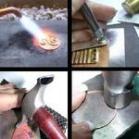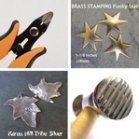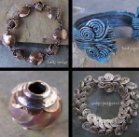Question about Bench Block
Stacy,
First, thanks for the wire jewelry Q & A! I'm new to working with wire (I love it, even though it has its frustrating moments!) and it has been very helpful.
I just received my bench block. It came soaked in oil and wrapped in paper and plastic. I wiped it clean with paper towel in order to use, but do I have to continue to oil it and store it wrapped when not it use? If yes, what type of oil would I use? If no, can it be stored unwrapped?
Thanks so much for your time!
Judith
Stacy's Answer:
Hi Judith!
Most steel tools come with some sort of protective greasy, oily coating on them. While it's a bit messy, it is necessary to keep the tools in good condition during shipping or being stored unused for long periods of time. Remember, they go from the manufacturer to the distributor to the retailer to the consumer. Who knows how long all that takes! Just wipe the gooey stuff off using a dry paper towel. Don't wash it off with water as water causes steel to rust!
It is not necessary to keep the greasy coating on your bench block. You don't want that stuff getting onto the wire/metal you're hammering and I'm sure you'll agree that removing it every time you want to use your block would get real old....real fast! If you were going to store it away for awhile, I would recommend coating it with a fine layer of machine or 3-in-1 oil and putting it in a ziplock-style bag. Steel tools, including your pliers, can get some bits of rust on them from time to time. To remove it, simply lightly buff with 0000 fine steel wool and apply a small amount of machine oil.
Because my block gets used on a regular basis, I leave mine out on my bench 24/7. Maybe once a year I have to hit it with steel wool. So, wipe off that block and have fun creating! Practice, practice, practice!!!!!
















